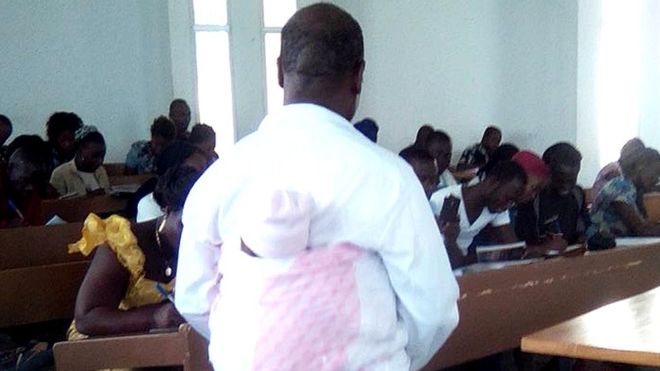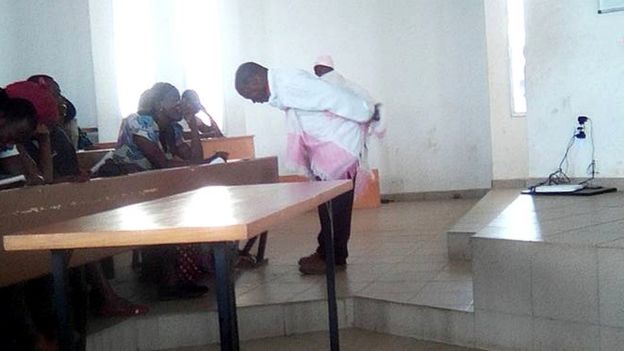bbcworldservice
jeudi 14 juillet 2016
samedi 2 juillet 2016
Ivory Coast's 'hero' professor backs student mothers

An Ivory Coast
professor, who was photographed carrying a student's baby in class in a
widely shared image, has said being a mother should not stop women
getting an education.
Honore Kahi offered to take the baby as he was crying and preventing the mother from sitting in class.
He said his students were surprised, began to laugh and then took pictures.
He told the BBC that they then realised that "this is a good father, this is a real man... [and] a role model".
Some of those sharing the photograph on social media praised him as a hero.
Mr Kahi, who teaches communications at Ivory Coast's Bouake University, said that women should not be discouraged by people's perceptions of what they should be able to do.
Girls are less likely than boys to start primary education in sub-Saharan Africa and are under-represented at higher education, the UN says.

He said that when he took the baby and tied him on his back he stopped crying and fell asleep.
He knew how to do it by observing how women carry their children.
"In fact, men are able to do certain things, and usually it's the way society sees men that prevents them from doing these things."
Nigeria's Elechi Amadi, author of The Concubine, dies
Renowned Nigerian author Elechi Amadi has died of an undisclosed illness at the age of 82.
He
was most famous for The Concubine, which pictured the culture of
marriage and forbidden traditions and was originally published in 1966. The Concubine has been a recommended text in schools across Africa.
His other books include Sunset in Biafra, Peppersoup, The Slave and The Road to Ibadan. He died in hospital in the oil city of Port Harcourt.
A physics and mathematics graduate of the University of Ibadan, he also joined the Nigerian army and continued serving in it during the civil war, despite coming from the Niger Delta, which was part of the breakaway state of Biafra.
Analysis: Isa Sanusi, BBC Africa, Abuja
Amadi hails from the first generation of Nigerian writers, in the league of the likes of Chinua Achebe, JP Clark, Cyprian Ekwensi and Christopher Okigbo.
Many of them attended the prestigious College Umuahia or the University of Ibadan, which shaped their literary prowess.
Many Nigerians grew up reading his first novel The Concubine, which focuses on love in a southern village, and how it came into conflict with traditional life. He will best be remembered for the way he portrayed life in rural Nigeria and for the convoluted plots and changing views in his novels.
Amadi was an officer in the Nigerian military at a turbulent time, the 1967-1970 civil war, when the military put down an attempt to create an independent state in the east.
It spawned Amadi's only non-fiction work, Sunset at Biafra, in 1973, detailing his experiences during the war.
Though many books have written on the conflict, his work stands out for accuracy, neutrality and conciseness.
In 2009, he was kidnapped by gunmen in his hometown in southern Nigeria. He was rescued 23 hours later.
BBC
Slavery in Mauritania Persists Despite Efforts to Abolish It
The U.S. State Department’s annual report on trafficking in persons said
Mauritania does not fully comply with minimum standards for eliminating
the practice and is not making "significant efforts" to do so. From
Nouakchott, Ahmed Moussa reports on a family held captive more than 30
years after Mauritanian formally outlawed slavery. Salem Solomon
narrates.
Inscription à :
Commentaires (Atom)
